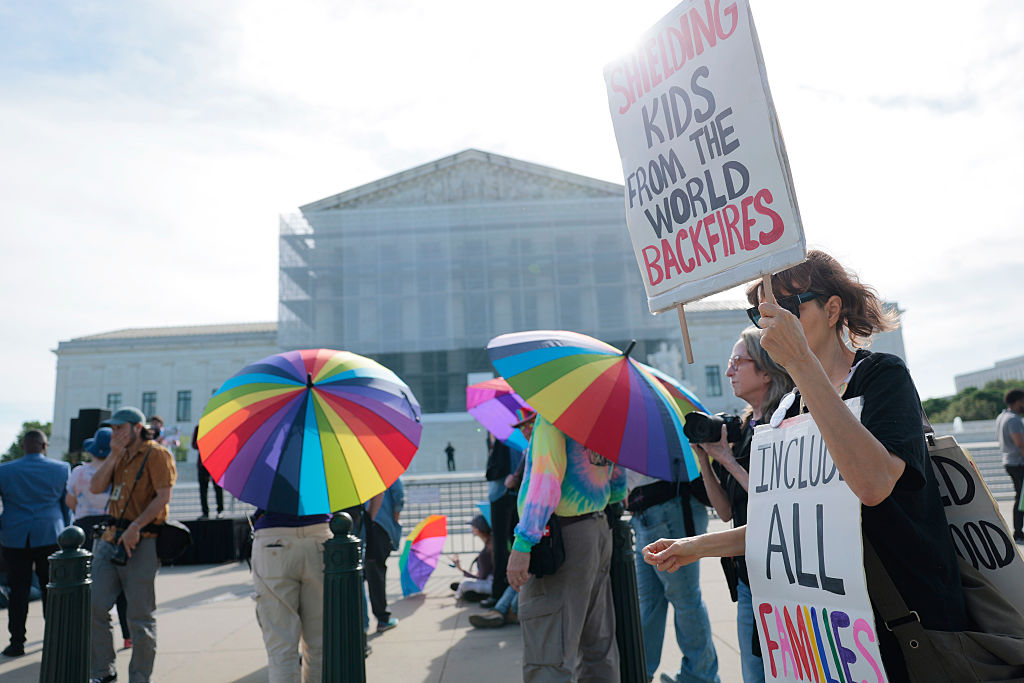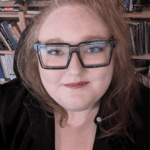Conservative organizations like Moms for Liberty have made no secret of their attempts to eradicate books that include LGBTQ2S+ people and people of colour from the public sphere. But as public sentiment turns against book bans, pro-censorship activists are taking a back-door book ban to the Supreme Court.
In Mahmoud v. Taylor, a group of parents in Montgomery County, Maryland, are asking the Supreme Court to force their school district to allow them to opt their children out of using books they claim are against their religious beliefs. The books in question are titles like Prince & Knight, Uncle Bobby’s Wedding and Pride Puppy—books with LGBTQ2S+ characters and themes.
In oral arguments on April 22, “the conservative majority on the Court—and unfortunately that’s the majority of the Court now—seem[ed] very interested in letting the religious objectors have an opt out to any use of materials that could be considered LGBTQ2S+-friendly,” warned Elliot Mincberg, senior fellow of People For, speaking to Xtra.
The case began when Montgomery County Public Schools added a list of “LGBTQ2S+-inclusive texts” for teachers to use in the classroom at the start of the 2022–23 school year. While MPCS initially offered parents the ability to opt their children out of lessons that included these and other books, they reversed course at the start of the 2023–24 school year, citing the logistical difficulties of the policy.
The parents pushing for the opt-out claim that the policy violates their First Amendment right to freely exercise their religion. They’re being represented by the Becket Fund for Religious Liberty, a right-wing law firm with a history of weaponizing claims of religious freedom to erode access to birth control, pave the way for anti-LGBTQ2S+ discrimination and undermine unions. They’ve weighed in on major cases with serious implications for the LGBTQ2S+ community like Burwell v. Hobby Lobby, 303 Creative LLC v. Elenis, Janus v. AFSCME and Dobbs v. Jackson Women’s Health Organization, which repealed Roe v. Wade and eliminated the right to abortion.
Among Becket’s board members is a name that raises red flags for many: Leonard Leo. Leo rose to infamy during the first Trump administration for his role in building the conservative supermajority on the Supreme Court. He also spearheaded the administration’s work to pack over 230 Federalist Society-backed ultraconservative judges onto our circuit and district courts.
Leo hasn’t been shy about his latest crusade to “crush liberal dominance.” He specifically singled out the “woke-ism” in corporations and education and “entertainment that’s really corrupting our youth.”
The Becket lawyers and organizations supporting the religious parents seem to be leaning into Leo’s fight against “corrupting” our youth. They’ve put out pithy but misleading quotes about how Montgomery County is “pushing inappropriate gender theory” and “forcing toddlers to learn about drag queens.”
“If you’re a teacher, and your choice is to use an LGBTQ2S+-themed book, but you have to worry about popping some kids out, or to just use some other book—what’s easier?”
If you read the books in question, you’ll quickly see that none of this is true. Prince & Knight is a pretty standard fairy tale along the lines of Disney’s interpretation of Sleeping Beauty—but the knight and the prince are both boys. Uncle Bobby’s Wedding is about a little girl worried she’ll get less time with her favourite uncle if he gets married—he just happens to be marrying a man. Pride Puppy is an alphabet book about a puppy who gets lost at a Pride parade.
The only difference between these and other books for the same age range is that they include representations of LGBTQ2S+ people. The books aren’t even required reading—they are simply present in the classrooms for kids to read if they so choose and for teachers to use in read-alouds if they do.
The parents objecting to the books claim that they’re not asking for “an LGBTQ2S+-free classroom,” just that teachers not read books aloud that have LGBTQ2S+ people in them while their children are present. Or talk about LGBTQ2S+ people. Or acknowledge that they exist, it seems.
While it’s not a book ban in name, in practice it feels a lot like the “Don’t say gay” laws passed in places like Florida, Ohio and North Carolina in 2022 and 2023. These laws were also billed as part of the “parental rights” movement, and are designed to erase queer people and stories from public schools, with only vague concepts of how they would be implemented or enforced.
So what would this policy look like if implemented? Will teachers have to come up with a separate curriculum for specific students any time a queer person is involved in a book or moment in history? Would books featuring LGBTQ2S+ people have to live on a restricted shelf, with teachers constantly monitoring which students are allowed to access them? Would teachers be expected to notify parents any time a question was asked about an LGBTQ2S+ person or book?
“If you’re a teacher, and your choice is to use an LGBTQ2S+-themed book, but you have to worry about popping some kids out, or to just use some other book—what’s easier?” asked Mincberg, who has researched and analyzed the Supreme Court and religious liberty for nearly 40 years. Whether it’s called a ban or not, Mincberg says, this challenge makes LGBTQ2S+ books “extremely difficult to use,” and “has the effect of a ban.”
“What this does is effectively give a lot of power to a small minority of parents,” says Mincberg. The plaintiffs might say they only want to control what their kids are exposed to, but in the context of a classroom, that’s hard to do—and the ruling ends up affecting all kids in the classroom.
If the Supreme Court issues a broad ruling in favour of the parents when the current term ends in June, it could be exactly the foot in the door the conservative movement is looking for to erase LGBTQ2S+ stories and people from schools across the country.
In many ways, this is history repeating itself. In the ’70s and ’80s, “there were attempts to argue that people should be able to opt out of curricula because they promoted the so-called ‘anti-religion of secular humanism,’” says Mincberg. “Fortunately, the courts ruled there that simple exposure did not produce the kind of significant burden on religion that is necessary under the pre-Exercise Clause. Here, we’re seeing an effort to try to change that.”
Establishing precedent for a soft ban like the opt-out policy would certainly give far-right forces like Leo and Becket a foot in the door to wage their continued war on the inclusion of LGBTQ2S+ people and stories in public spaces.
And this exclusion, not the books, is what actually puts students at risk. Ollie Mooney, a student from Frederick, Maryland, spoke at a rally at the Supreme Court the day of the oral arguments. “Representation in schools isn’t about making kids queer, it’s about making kids that are queer or have queer families feel safe,” says Mooney, who has been bullied for being a member of the LGBTQ2S+ community. They have “cried and fought against going to school because we were so exhausted from dealing with the torment other students put us through.
“Representation not only helps teach other kids that differences are okay, but it lets queer kids see a piece of ourselves in the world,” says Mooney.
“You know what it boils down to? It all boils down to control,” Maryland parent Jamie McGonnigal tells Xtra. “All you’re doing by trying to ban these books or opt your child out of these books is stopping your child from engaging in a world they already exist in.
“My kid is the child of two dads, and when he goes to school, I want him to be able to hear about families like mine, like his own,” McGonnigal says.
When McGonnigal’s son was in kindergarten, he went in to read books to his son’s class—including Prince & Knight. McGonnigal was worried there might be angry parents calling, but that didn’t happen. “If the kids even talked about it when they went home, it was mostly parents who were like ‘Oh, cool. You learned other people exist, who are different from your family.’ How is that a bad thing?”


 Why you can trust Xtra
Why you can trust Xtra


